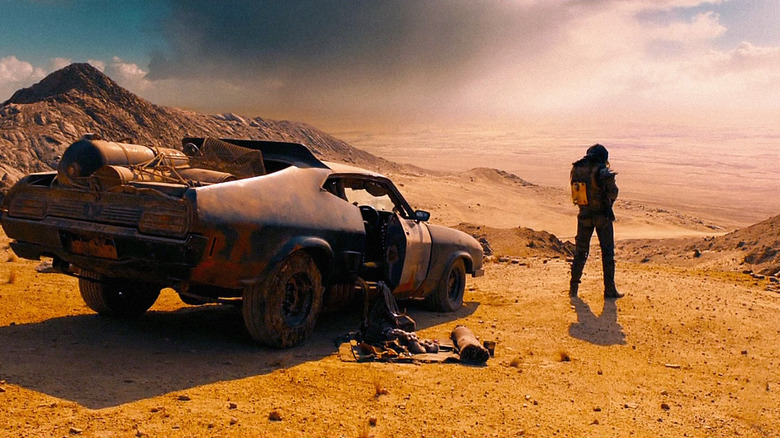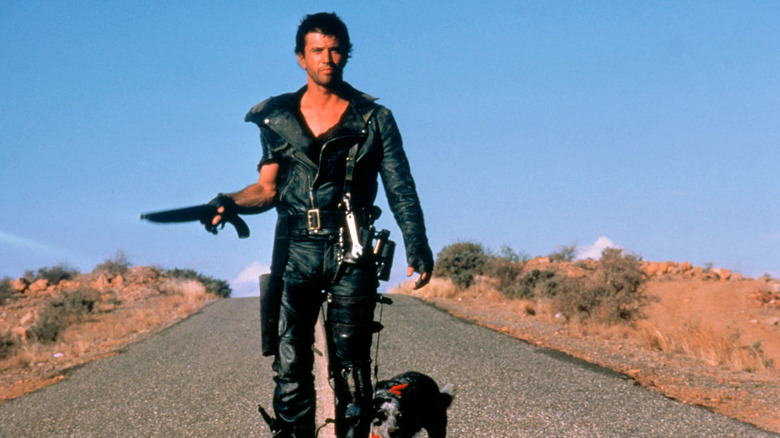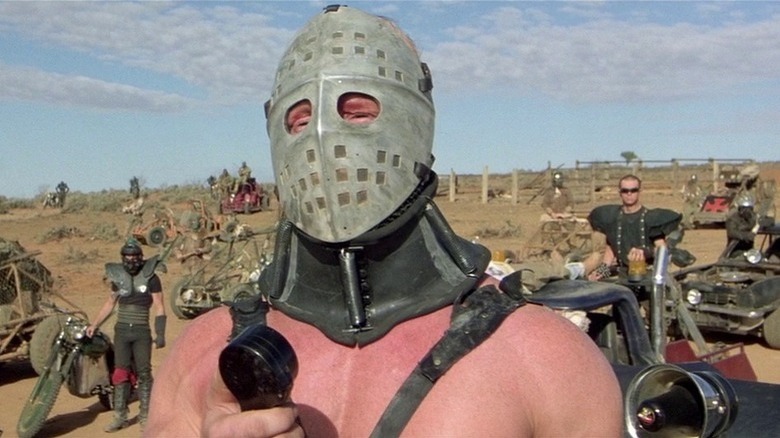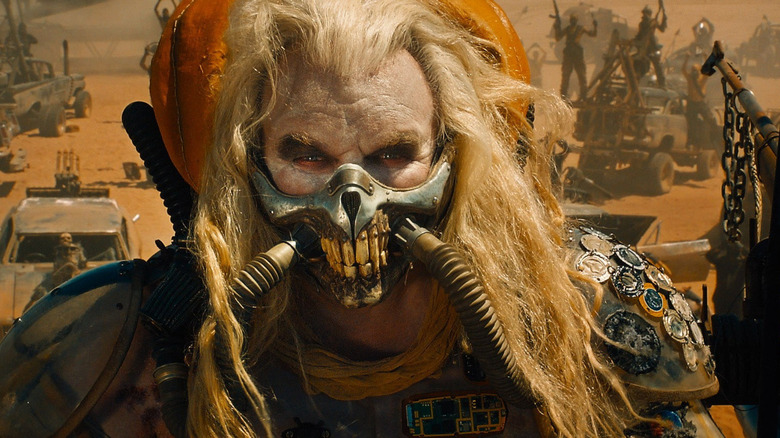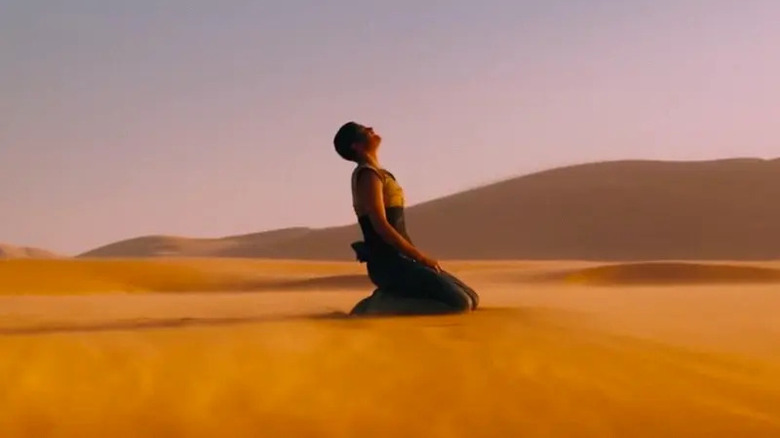Who Killed The World? How The Apocalypse Happened In The Mad Max Universe
The "Mad Max" franchise is one of the wildest movie franchises we have. It started as a small indie Ozploitation film made by a medical doctor-turned-filmmaker inspired by the many car accidents he witnessed growing up, and culminated into the Oscar-winning best film of the 2010s.
One of the best aspects of the franchise is its visual storytelling. George Miller is adept at telling you a story through pure visuals, with barely any dialogue or exposition. This means a lot is left up to audience interpretation or material outside the films, like the surprising backstory of the flamethrower guitar player in "Fury Road."
But this also means that a lot of information that impacts the story of the films is left up in the air, like the inciting incident of what exactly the apocalypse started in the universe of "Mad Max." Still, that won't stop us. With the upcoming "Furiosa" prequel turning back the clock to the early days of the end of the world, we're asking the important question, who killed the world?
The before times and the first Mad Max
According to the official comic book spin-offs of "Fury Road," at some point in the near future, black fuel (what they call oil in the franchise) started to run out, causing riots and wars over control of the remaining sources of oil — later referred to as the Fuel Wars. Soon after, the Water Wars broke out, which were not about literal water, but a series of uprisings against the reckless approach by the government to the environmental crisis.
This led to anarchy, with governments struggling to combat the gangs and militias that started to take over the rural areas. By the time of the first "Mad Max," the world is still relatively the same. There are vast pastures in Australia and the ocean is still wet. Sure, gasoline is scarce, but everyone is still driving around in cool cars and bikes.
The real problem is that biker gangs terrorize the countryside, killing people for their gas, but also for the fun of it. This leads to the creation of the Main Force Patrol in Australia, a leather-clad highway patrol force that chases down criminals with a lot of speed, and as much violence. They are the only rule of law out in the wasteland, and in the years after, society completely collapses, governments shut down, and civilization crumbles.
The Road Warrior wasteland and nuclear Thunderdome
Here is where things get tricky. In the timeline proposed by "Fury Road," a nuclear apocalypse takes place right before "The Road Warrior" (more on that in a bit), but in the original timeline, the world is still intact and it is only civilization that has collapsed.
With no fuel or resources, cities are emptied out, and people start heading into the desert, making small communities and fending off the gangs that now rule the land. In the three years since the first film, all sustainable communities have to stay mobile in order to avoid the roaming gangs, leading to an arms race revolving around custom vehicles that are faster, more powerful, and more dangerous.
In the timeline of George Miller's original trilogy, it is after the events of "The Road Warrior" that the nuclear apocalypse happens. The remaining world governments, desperate to get their hands on the last bit of oil, finally activate the nuclear option and kill all wildlife, plants, and oceans. The only thing that remains? Thunderdome.
It is in this film that we finally get some actual exposition into the history of the world, with Max seeing cave paintings detailing the nuclear war that followed the war for resources. Sure, there are still a few oases out there, but the world as we know it ended.
Fury Road and a new timeline
In the years after "Thunderdome," nuclear fallout ends ravaging the Earth, to the point where the remaining humans now barely know of a green world, and water is almost unheard of. By this point, Max has seen some stuff, and he's grizzled and hopeless, having seen any sliver of hope be killed by humans throughout the years.
The problem with "Fury Road" is that it was originally meant to be a proper sequel to "Beyond Thunderdome," with Max now an old warrior in his 50s, desperately clinging onto his humanity. But with production hell looming over the film and delaying it at every turn, the film eventually became a soft reboot, recognizing the events of the previous films but not directly following the plots.
In this new timeline, the nuclear apocalypse takes place right after the events of the first "Mad Max," with the titular Max fleeing out into the wasteland as the oceans dry up and people flee the cities.
Further complicating things is the fact that Max is around the same age as Furiosa, but talks with knowledge of the old world around the Vuvalini. And yet, the plot description of the "Furiosa" prequel implies that she was alive before the apocalypse.
So, when did the apocalypse happen?
Again, there are two answers. In the timeline of the original trilogy, the resource wars started in the '70s, as co-writer of "The Road Warrior" Terry Hayes was inspired by the 1979 oil crisis. There are also quick hints in the first film that point to the film being set in the mid-'80s, with "The Road Warrior" taking place three years after, and "Beyond Thunderdome" taking place 15 years after, it would make the actual nuclear apocalypse take place in the late '80s, with the world completely changed and ended by the '00s.
In the "Fury Road" timeline, however, the comic book prequels do name actual historical events and dates, like uprisings against the government of Australian PM Tony Abbott between 2013 and 2015, or the Fukushima disaster. These events lead to the uprisings that led to the fall of civilization around the 2010s, with the Fuel and Water Wars leading to the events of the first "Mad Max" that same decade. If we follow the math of the original trilogy, then nuclear war would happen towards the end of the decade.
